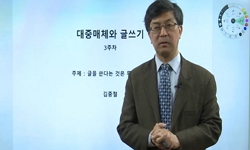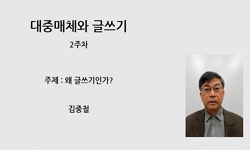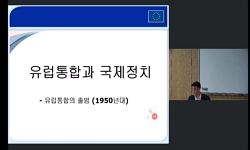This article examines the recent phenomena of “Korea Wave (Kanryu^)”and “Hate Korea Wave (Kenkanryu^) in contemporary Japanese society. I argue that the “(Hate) Korea Wave”is a part of larger phenomena related to the disintegration of “mai...
http://chineseinput.net/에서 pinyin(병음)방식으로 중국어를 변환할 수 있습니다.
변환된 중국어를 복사하여 사용하시면 됩니다.
- 中文 을 입력하시려면 zhongwen을 입력하시고 space를누르시면됩니다.
- 北京 을 입력하시려면 beijing을 입력하시고 space를 누르시면 됩니다.

조경수역에서 표류하는 일본 - 한류와 혐한류를 통해 본 현대 일본 사회 - = Understanding Contemporary Japanese Society through “Korea Wave”and“ Hate Korea Wave”
한글로보기부가정보
다국어 초록 (Multilingual Abstract)
(Kanryu^)”and “Hate Korea Wave (Kenkanryu^) in contemporary
Japanese society. I argue that the “(Hate) Korea Wave”is a part of
larger phenomena related to the disintegration of “main stream
consciousness”during the economic recession of the 1990s. The“ main
stream consciousness”refers to the collective self-perception of
Japanese people in which 90% of Japanese considered themselves as
members of new middle-class. Both “Korea Wave”and “Hate Korea
Wave”have their roots in populism embedded in the frustration and
distrust toward the established order and the ambivalent expectation
for reform of the existing social system. It still remains to be seen
how these contradictory undercurrents in Japanese society will
transform Japan’s self-perception and view of the other.
This article examines the recent phenomena of “Korea Wave
(Kanryu^)”and “Hate Korea Wave (Kenkanryu^) in contemporary
Japanese society. I argue that the “(Hate) Korea Wave”is a part of
larger phenomena related to the disintegration of “main stream
consciousness”during the economic recession of the 1990s. The“ main
stream consciousness”refers to the collective self-perception of
Japanese people in which 90% of Japanese considered themselves as
members of new middle-class. Both “Korea Wave”and “Hate Korea
Wave”have their roots in populism embedded in the frustration and
distrust toward the established order and the ambivalent expectation
for reform of the existing social system. It still remains to be seen
how these contradictory undercurrents in Japanese society will
transform Japan’s self-perception and view of the other.
참고문헌 (Reference)
1 오사와 마리, "회사인간사회의 성:현대일본을 젠더로 읽다" 나남출판 1995
2 이따가끼 류우따, "혐한류의 해부학" 34 (34): 2006
3 다카하라 모토아키, "한중일 인터넷 세대가 서로 미워하는 진짜 이유:불안형 내셔널리즘의 시대, 한중일 젊은이들의 갈등 읽기" 삼인 2007
4 오구라 키조오, "한류와 혐한류의 공통성" 34 (34): 2006
5 하라타유키에, "한국을소비하는일본:한류, 여성, 드라마" 책세상 133-, 2005
6 장화경, "젠더의 관점에서 본 전후 일본의 가족관련복지정책의 변용, In 일본형시스템:위기와 변화" 일조각 2005
7 김영작, "일본형 시스템:위기와 변화" 일조각 2005
8 오노 고지, "일본의 정치문화, In 현대일본의 정치와 사회" 매봉 2005
9 임경택, "일본대중문화속의‘한류’, In 일본한류, 한국과 일본에서 보다" 한국학중앙연구회 2007
10 한상일, "일본, 만화로 제국을 그리다:조선병탄과 시선의 정치의 에필로그" 일조각 2006
1 오사와 마리, "회사인간사회의 성:현대일본을 젠더로 읽다" 나남출판 1995
2 이따가끼 류우따, "혐한류의 해부학" 34 (34): 2006
3 다카하라 모토아키, "한중일 인터넷 세대가 서로 미워하는 진짜 이유:불안형 내셔널리즘의 시대, 한중일 젊은이들의 갈등 읽기" 삼인 2007
4 오구라 키조오, "한류와 혐한류의 공통성" 34 (34): 2006
5 하라타유키에, "한국을소비하는일본:한류, 여성, 드라마" 책세상 133-, 2005
6 장화경, "젠더의 관점에서 본 전후 일본의 가족관련복지정책의 변용, In 일본형시스템:위기와 변화" 일조각 2005
7 김영작, "일본형 시스템:위기와 변화" 일조각 2005
8 오노 고지, "일본의 정치문화, In 현대일본의 정치와 사회" 매봉 2005
9 임경택, "일본대중문화속의‘한류’, In 일본한류, 한국과 일본에서 보다" 한국학중앙연구회 2007
10 한상일, "일본, 만화로 제국을 그리다:조선병탄과 시선의 정치의 에필로그" 일조각 2006
11 주영하, "일본 한류를 바라보는 시각, In 일본 한류, 한국과 일본에서 보다" 한국학중앙연구회 15-16, 2007
12 주영하, "일본 한류, 한국과 일본에서 보다" 한국학중앙연구원 2007
13 채지영, "일본 한류 소비자연구:한류마니아와 일반 소비자의 소비행태를 중심으로" 한국문화관광정책연구원 2005
14 조규철, "복지국가의 쇠퇴와 비영리단체의 대두, In 일본형시스템:위기와 변화" 일조각 2005
15 이기완, "고이즈미식 포퓰리즘과 2005년 중의원 선거" 아세아문제연구소 49 (49): 173-194, 2006
16 石田佐惠子, "韓流ブ一ムのさまざまな語り手たち:他者表象と越境する文化, In ポスト韓流のメデイア社會學" ミネルブァ書房 44-, 2007
17 小倉紀藏, "韓流インパクト:ルックコリアと日本の主體化" 講談社 2005
18 中央公論編輯部, "論爭中流崩壞" 中公新書 2001
19 波佐場淸, "朝日新聞と韓流:ブ一ム越える‘國つくり’のパウ一, In ポスト韓流のメデイア社會學" ミネルブァ書房 2007
20 大嶽秀夫, "日本型ポピュリズム:政治への期待と幻滅" 中央新書 2003
21 藤原正彦, "國家の品格" 新潮社 2005
22 瀨川成子, "作り手たち" 7/1 (7/1): 24-, 2004
23 山野車輪, "まんが嫌韓流2" 普遊舍 255-, 2006
24 "『まんが嫌韓流』讀者の聲, In まんが嫌韓流公式ガイドブック" 普遊舍 15-38, 2006
25 鵜野光博, "“嫌韓流現象”を讀み解く, In 別冊 正論" 233-, 2004
26 中澤明子, "“冬ソナ”に胸キュン" (36) : 2003
27 Tessa Morris-Suzuk, "Virtual Memories:Japanese History Debates, in Manga and Cyberspace" 26 (26): 2002
28 Norimitsu Onishi, "Ugly Images of Asian Rivals Become Best Sellers in Japan"
29 Kristin Kyoko Altman, "Television and Political Turmoil:Japan’s Summer of 1993, In Media and Politics in Japan" Hawaii Press 1993
30 David Thorburn, "Television Melodrama, In Television: The Critical View" Oxford University Press 1994
31 William W. Kelly, "Students, Slackers, Singles, Seniors, and Strangers Transforming a Family Nation, In Beyond Japan:The Dynamics of East Asian Regionalism" Cornell University Press 2006
32 Richard Campbell, "Securing the Middle Ground:Reporter Formulas in 60 Minutes, In Television:The Critical View" Oxford University Press 1994
33 Robert Pekkanen, "Molding Japanese Civil Society:State-Structured Incentives and the Patterning of Civil Society, In The State of Civil Society in Japan" Cambridge University Press 2003
34 Laurie Freeman, "Mobilizing and Demobilizing the Japanese Public Sphere:Mass Media and the Internet in Japan, In The State of Civil Society in Japan" Cambridge University Press 2003
35 Susan J. Pharr, "Media and Politics in Japan: Historical and Contemporary Perspectives, In Media and Politics in Japan" Hawaii Press 4-, 1996
36 Andrew Gordon, "Managing the Japanese Household:The New Life Movement in Postwar Japan" (Summer) : 1997
37 Maggie Farley, "Japan’s Press and the Politics of Scandal, In Media and Politics in Japan" Hawaii Press 1996
38 Robert Pekkanen, "Japan’s New Politics:The Case of the NPO Law" 26 (26): 2000
39 Ezra F. Vogel, "Japan’s New Middle Class:The Salary Man and His Family in a Tokyo Suburb" University of California Press 1971
40 Thomas P. Rohlen, "Japan’s High Schools" University of California Press 1983
41 Jim Frederick, "Gross National Cool"
42 Robert J. Smith, "Gender Inequality in Contemporary Japan" 13 (13): 1997
43 Laurie Anne Freeman, "Closing the Shop: Information Cartels and Japan’s Mass Media" Princeton University Press 2000
동일학술지(권/호) 다른 논문
-
- 동북아역사재단
- 이병건
- 2008
- KCI등재후보
-
역사 화해를 위한 ‘다원주의 역사 수업’가능성 모색 - 야스쿠니 수업을 중심으로 -
- 동북아역사재단
- 박중현
- 2008
- KCI등재후보
-
- 동북아역사재단
- 윤휘탁
- 2008
- KCI등재후보
-
- 동북아역사재단
- 위나이밍
- 2008
- KCI등재후보
분석정보
인용정보 인용지수 설명보기
학술지 이력
| 연월일 | 이력구분 | 이력상세 | 등재구분 |
|---|---|---|---|
| 2026 | 평가예정 | 재인증평가 신청대상 (재인증) | |
| 2020-01-01 | 평가 | 등재학술지 유지 (재인증) |  |
| 2017-01-01 | 평가 | 등재학술지 유지 (계속평가) |  |
| 2013-01-01 | 평가 | 등재학술지 유지 (등재유지) |  |
| 2010-01-01 | 평가 | 등재학술지 선정 (등재후보2차) |  |
| 2009-01-01 | 평가 | 등재후보 1차 PASS (등재후보1차) |  |
| 2007-01-01 | 평가 | 등재후보학술지 선정 (신규평가) |  |
학술지 인용정보
| 기준연도 | WOS-KCI 통합IF(2년) | KCIF(2년) | KCIF(3년) |
|---|---|---|---|
| 2016 | 1.18 | 1.18 | 1.19 |
| KCIF(4년) | KCIF(5년) | 중심성지수(3년) | 즉시성지수 |
| 1.06 | 0.98 | 2.155 | 0.1 |




 KCI
KCI







